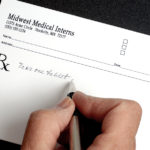Your Call is Important to Us: How Pharmacy Techs Can Stay Sane Amidst Chaos

The sounds of the pharmacy ring loud and clear. Spatulas counting tablets by fives, the ring of the drive-through bell, pill bottles returned to shelves, and (of course) the phone. The DARN phone, it NEVER stops! Pharmacy technicians must balance customer needs, dispensing duties, inventory management, and their own mental health. Often the sound of the phone ringing seems like just enough to fry that last nerve. Even the renowned "super tech" may struggle to stay sane while managing so many roles, and just when you feel caught up the pharmacist hollers to answer the phone. OUCH! It's time to make an important choice – do you tell the pharmacist you are busy, answer the phone and lose track of which refill you were processing, or perhaps (in a not so subtle but effective move) throw the phone into the returns bin and find a new line of work?
High Expectations and Strong Emotions
Providing excellent customer service during a pandemic is not easy! Extra phone calls related to COVID testing or hand sanitizer may cause stress levels to soar. The Centers for Disease Control offer some tips to help healthcare personnel cope and stay resilient. These suggestions include the following:
1. Communicate openly with colleagues about job stress, and work together to find solutions.
2. Remember everyone is in an unusual situation with limited resources.
3. Realize there are work factors that you have no control over.
4. Recognize that you are providing a crucial role in fighting the pandemic and doing the best you can with what you have available.
Overwhelmed technicians may also communicate with their pharmacist about ways to reduce the stress associated with the busy environment, including rotation of job roles and assignment of job responsibilities, such as answering the phone. Hopefully, the pharmacist will listen and respond.
RELATED: Crunching Numbers: How Pharmacy Techs Can Keep It All Straight
Slowing Down During Operation Warp Speed
Although it is a reasonable first effort, communication strategies may ultimately have little effect on the business of retail pharmacy. The overwhelmed pharmacy technician can also reach for coping strategies that can be done anytime, and which will support their mental health. Here are some simple ideas for staying calm while the script count never slows. First, consider designating a one-minute mental break at the top of each hour. This could look like taking a series of deep breaths, or a simple exercise such as leaning over and touching your toes. Another option could be each time you look out a window and see a cloud, wait a few moments until you see the cloud move before resuming activities. These brief moments of calm may sound silly or unnecessary, but a few seconds to periodically perform self-care can lower stress.
But That Phone Is Still Ringing!
Despite improved communication with the pharmacist and stealing a moment to slow your heart rate and thoughts, ultimately the pharmacy work environment is shaped by the duties that are required by the pharmacist. This is particularly true for the tasks that can only be completed by a pharmacist, and they are responsible for everything that happens in the pharmacy! It may appear as though they are simply staring at a screen or answering questions about the latest drug to be featured in a commercial. However, their responsibilities include double-checking all prescriptions before it is sold to a patient, ensuring all prescriptions are legal and valid, adhering to all state and federal regulations, keeping accurate records, and paying close attention to detail. Unlike a pharmacy technician, there is no higher-level professional to check the pharmacist's work, and mistakes can have grave consequences.
Although it isn't necessarily noticed by technicians or customers, pharmacists may perform their final check with a series of "rights" while verifying the prescription: it is critical that the right dose of the right drug reaches the right patient at the right time via the right route. Unfortunately, the truth is that from the pharmacist perspective, the ringing phone represents an interruption to this thought process, which could result in having to restart the verification. If the pharm tech is able to answer (and screen!) all phone calls that do not directly require the pharmacist knowledge, then the pharmacist is able to focus on those activities that do require the additional clinical knowledge and resources that were obtained through a doctorate level of education. Other tasks that may be required to be completed by a pharmacist include inventory of controlled drugs and supervising or training of student interns and other personnel.
RELATED: What is the Difference Between a Pharmacy Technician and a Pharmacist?
But Does Team Work Make the Dream Work?
The hard truth is sometimes it does, and sometimes it doesn't. The pharmacist and pharm tech can accomplish the most when working together – like how the right hand helps the left. But when it comes down to it…it's probably the hand of the pharmacy technician that answers most calls. Take a deep breath…you got this!






